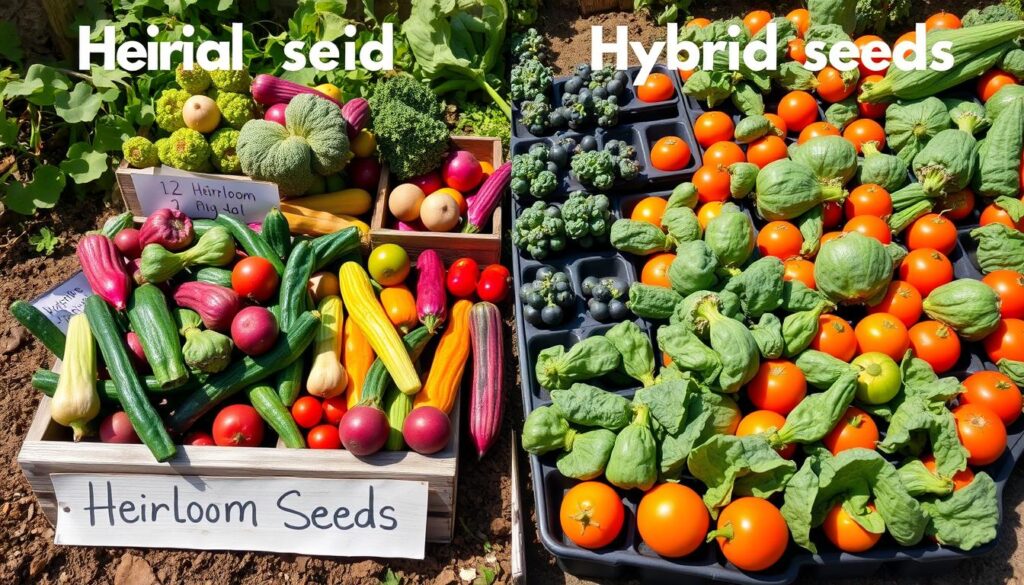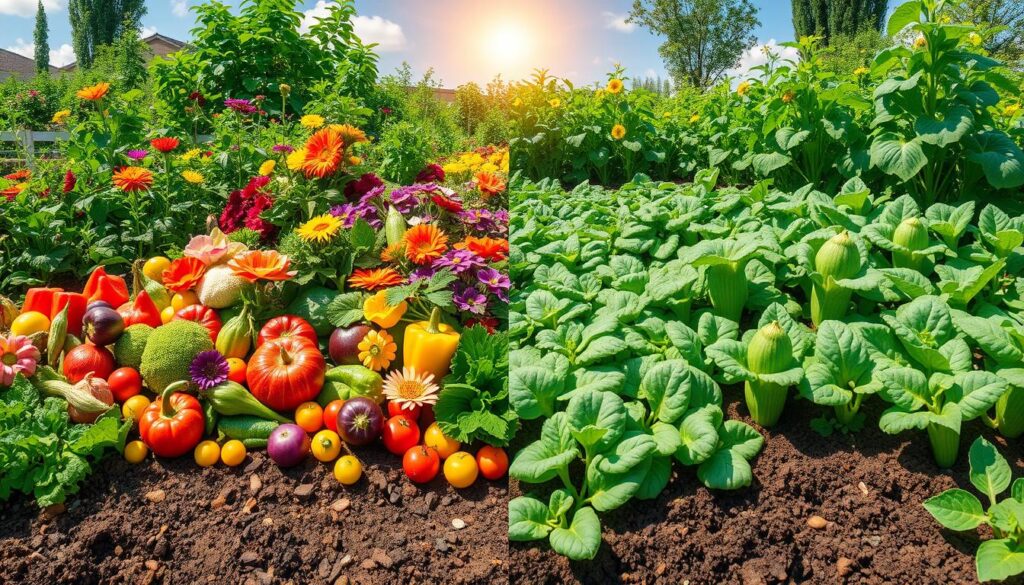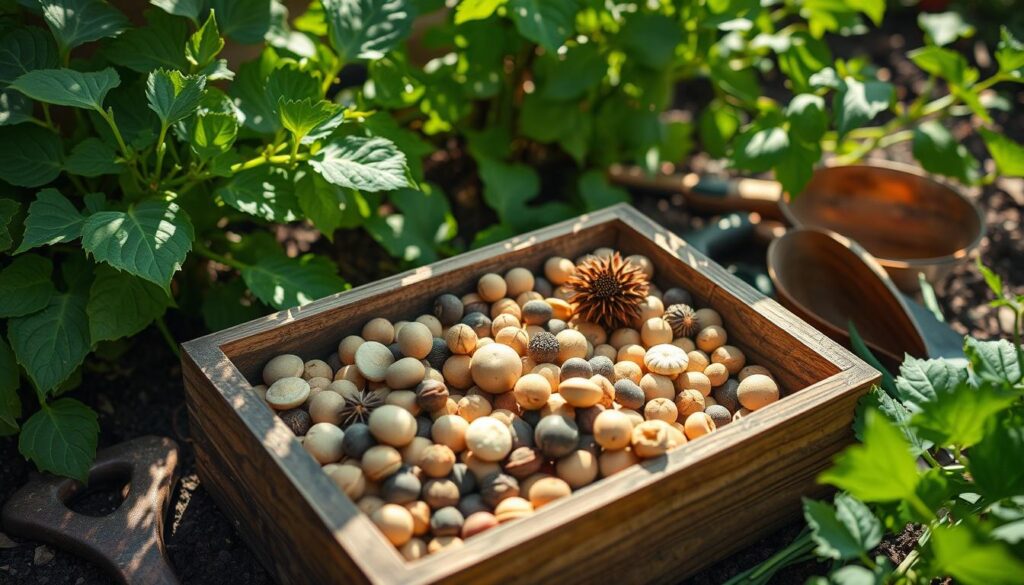Choosing the right seeds for your garden is key. Heirloom seeds and hybrid seeds have their own pros and cons. For organic gardening, knowing the difference is vital. Plant breeding has created many vegetable varieties, but consider growth, cost, and disease resistance.

Heirloom and hybrid seeds are popular in gardening. Heirloom seeds let gardeners save seeds from their harvest. Hybrid seeds are bred for traits like better yield and disease resistance. Think about cost, nutritional value, and plant vigor when choosing.
Key Takeaways
- Heirloom seeds are open-pollinated, allowing gardeners to save seeds from their harvest
- Hybrid seeds are bred for specific traits such as improved yield and disease resistance
- Growth characteristics, cost, and disease resistance are essential factors to consider when choosing between heirloom and hybrid seeds
- Organic gardening often involves the use of heirloom seeds, which can be more cost-effective in the long run
- Plant breeding has led to the development of various vegetable varieties, giving gardeners many options
- Understanding the differences between heirloom and hybrid seeds helps gardeners make better choices
Understanding the Basics: Defining Heirloom and Hybrid Seeds
Choosing the right seeds for your garden is key. Heirloom seeds are open-pollinated, meaning they’re pollinated by bees, butterflies, or wind. This results in unique and varied plants. Hybrid seeds, on the other hand, are bred for traits like disease resistance and higher yields.
Understanding these seeds starts with their genetics. Heirloom seeds, or non-gmo seeds, have more genetic diversity. Hybrid seeds offer more predictable results. This is important for gardeners who want to choose wisely.
What Are Heirloom Seeds?
Heirloom seeds are saved and passed down through generations. They’re linked to traditional plants. These seeds help preserve genetic diversity and offer many varieties to choose from.
What Are Hybrid Seeds?
Hybrid seeds are bred for specific traits like disease resistance and flavor. They’re used in both commercial farming and home gardens. While they’re more predictable, they lack the genetic diversity of heirloom seeds.
Key Genetic Differences
The genetic differences between heirloom and hybrid seeds are big. Heirloom seeds have more genetic diversity, leading to varied traits. Hybrid seeds, though predictable, may be more susceptible to disease and pests.
Knowing the basics of heirloom and hybrid seeds is vital. It helps gardeners make informed choices based on genetic diversity, disease resistance, and yield. This way, they can pick the best seeds for their garden.
| Seed Type | Genetic Diversity | Disease Resistance | Yield Potentia |
|---|---|---|---|
| Heirloom Seeds | High | Variable | Variable |
| Hybrid Seeds | Low | High | High |
Comparing Growth Characteristics and Yield Potentials
Heirloom seeds show more variation in growth, with some plants taller or fruitier than others. Hybrid seeds, on the other hand, are bred for steady growth and bigger harvests. Yet, heirloom seeds often resist diseases better and adapt to changing weather, key for garden sustainability.
Hybrid seeds usually yield more, but heirloom seeds offer tastier and healthier food. Your choice between heirloom seeds vs. hybrid seeds depends on what you want from your garden. For high yields and steady growth, go with hybrid seeds. For unique tastes, disease resistance, and garden sustainability, heirloom seeds are a better pick.
Here are some key factors to consider when comparing heirloom and hybrid seeds:
- Growth characteristics: variable vs. consistent
- Yield: higher yields vs. more flavorful produce
- Disease resistance: heirloom seeds often more resistant
- Adaptability: heirloom seeds more adaptable to changing environmental conditions

Knowing the differences in growth characteristics and yield between heirloom and hybrid seeds helps you choose the right seed for your garden. This choice supports garden sustainability and a fruitful harvest.
| Seed Type | Growth Characteristics | Yield | Disease Resistance |
|---|---|---|---|
| Heirloom | Variable | Lower yields | Higher resistance |
| Hybrid | Consistent | Higher yields | Lower resistance |
Cost Considerations and Long-term Investment Analysis
Choosing between heirloom seeds and hybrid seeds involves thinking about cost. Heirloom seeds might cost more upfront, but they save money over time. This is because you can save seeds from one harvest to plant the next year.
Heirloom seeds are cheaper in the long run because you can save them. Hybrid seeds, on the other hand, need to be bought every year. Heirloom seeds can also lead to better-tasting food and can be shared with others, saving even more money.
Initial Seed Purchase Expenses
The price of seeds is a big part of the decision. Heirloom seeds are pricier than hybrid seeds at first. But, they are a smart investment for the future.
Seed Saving Economics
Seed saving is key with heirloom seeds. It lets you grow your own seeds and save money. You can also create seeds that work best in your area.

Season-to-Season Cost Comparison
Looking at costs over time, heirloom seeds are more cost-effective. They might cost more at first, but saving seeds saves money later. Hybrid seeds, needing to be bought every year, are more expensive over time.
Heirloom Seeds vs. Hybrid Seeds: Which Is Better for Your Garden?
Choosing between heirloom seeds and hybrid seeds depends on your garden needs. Heirloom seeds bring genetic diversity, disease resistance, and adaptability. On the other hand, hybrid seeds are known for their consistent growth and high yields.
In organic gardening and sustainable agriculture, heirloom seeds are often the top pick. They let gardeners save seeds, reducing reliance on outside suppliers. Plus, heirloom seeds often have richer flavors, making them a favorite for those who value taste and nutrition.
When deciding between heirloom seeds and hybrid seeds, consider a few things:
- Climate and soil conditions
- Gardening goals and priorities
- Personal preferences for flavor, nutrition, and sustainability
- Availability of garden seeds and seed saving options
The choice between heirloom seeds and hybrid seeds depends on your garden’s needs. By thinking about these factors, you can choose the best seeds for your garden.
Choosing the right seeds supports sustainable agriculture. It also makes gardening more rewarding and productive.
| Seed Type | Genetic Diversity | Disease Resistance | Yield Potentia |
|---|---|---|---|
| Heirloom Seeds | High | High | Variable |
| Hybrid Seeds | Low | Medium | High |
Disease Resistance and Plant Vigor
Heirloom seeds and hybrid seeds both have their good points and bad points. Heirloom seeds often fight off diseases naturally, which is great for gardeners. Hybrid seeds, on the other hand, are made to fight off specific diseases, making them a top pick for big farmers.
Where you live also matters a lot for disease resistance. Heirloom seeds are often made for local conditions and grow well where they come from. Hybrid seeds might need more help to grow well in different places.
Natural Immunity in Heirloom Varieties
Heirloom seeds have learned to fight off diseases over time. This is good for gardeners because it means they can grow plants without using harmful chemicals. It’s a greener way to garden.
Enhanced Resistance in Hybrid Breeds
Hybrid seeds, though, are made to fight off specific diseases. This is great for farmers who want to grow lots of food. But, hybrid seeds might not be as strong against diseases because they don’t have as much genetic variety.
Regional Adaptation Factors
Where you live is key to how well seeds fight off diseases and grow strong. Gardeners should think about their local climate, soil, and pests when picking seeds. This helps them choose the right seeds for their garden.
So, whether to choose heirloom seeds or hybrid seeds depends on what you need. Think about disease resistance, how strong the plants will be, and how well they’ll do in your area. This way, gardeners can pick the best seeds for their garden.
| Seed Type | Disease Resistance | Plant Vigor | Regional Adaptation |
|---|---|---|---|
| Heirloom Seeds | Natural immunity to certain diseases | Variable, depending on variety | Often more adapted to local conditions |
| Hybrid Seeds | Enhanced resistance to specific diseases | Generally higher, due to breeding | May require more maintenance and care |
Taste, Nutrition, and Market Value
Heirloom seeds often beat hybrid seeds in taste and nutrition. They come in a variety of colors, textures, and flavors. This makes them a hit with gardeners and chefs.
For example, heirloom tomatoes have a rich, complex taste. This is something hybrid tomatoes often lack. Hybrid seeds, though, offer consistent flavor and texture. But they might not have the nutritional benefits and variety of heirloom seeds.
Heirloom seeds can also fetch a higher price because of their unique traits and rarity. Many people are willing to pay more for organic produce grown with heirloom seeds. They see it as more flavorful and nutritious. Hybrid seeds, being more common and affordable, are a favorite among commercial farmers.
Some key benefits of using heirloom seeds include:
- Improved taste and nutrition
- Increased market value for organic produce
- Support for biodiversity and sustainable farming practices
Choosing between heirloom and hybrid seeds depends on what you value most. If you want more flavorful and nutritious food, heirloom seeds are a good pick. But if you’re after consistent yields and lower costs, hybrid seeds might be better.
Conclusion: Making the Right Choice for Your Garden
Choosing between heirloom and hybrid seeds depends on your garden goals. Heirloom seeds bring genetic diversity, natural disease resistance, and adapt to local conditions. They’re great for sustainable, organic gardening.
Hybrid seeds, on the other hand, offer consistent growth, higher yields, and better disease resistance. Weighing their pros and cons helps you pick the best for your garden and the environment.
It doesn’t matter if you pick heirloom or hybrid seeds. What’s key is to garden organically and sustainably. This approach enriches the soil, boosts biodiversity, and reduces your environmental impact.
By choosing seeds wisely, you help preserve genetic diversity and support local food systems. You also get to enjoy the delicious, healthy food you grow.
FAQ
What are heirloom seeds?
Heirloom seeds are open-pollinated. This means they’re pollinated by bees, butterflies, or wind. This natural process leads to unique and varied traits.
What are hybrid seeds?
Hybrid seeds are bred for specific traits like disease resistance or better flavor. They offer more predictable results. But, heirloom seeds have more genetic diversity.
How do the growth characteristics and yield differ between heirloom and hybrid seeds?
Heirloom seeds grow differently, with some plants taller or fruitier than others. Hybrid seeds are bred for consistent growth and high yields. Yet, heirloom seeds might be more resistant to diseases and adapt better to changing environments.
What are the cost considerations and long-term investment analysis when comparing heirloom and hybrid seeds?
Heirloom seeds might cost more upfront. But, they can save money in the long run. You can save and replant them, reducing the need for new seeds every year. Hybrid seeds, needing to be bought annually, can be more expensive over time.
How do heirloom and hybrid seeds differ in terms of disease resistance and plant vigor?
Heirloom seeds often resist certain diseases naturally. Hybrid seeds are bred for better resistance. Yet, heirloom seeds might be more prone to pests and diseases because of their genetic diversity. Hybrid seeds, lacking diversity, could be more vulnerable to diseases. Local conditions also affect disease resistance, with heirloom seeds often better suited to local environments.
How do heirloom and hybrid seeds differ in terms of taste, nutrition, and market value?
Heirloom seeds often produce more flavorful and nutritious food. They come in a wider range of colors, textures, and flavors. Hybrid seeds might offer consistent taste and texture but lack the nutritional diversity of heirloom seeds. Heirloom seeds can also have higher market value because of their unique traits and limited availability.




